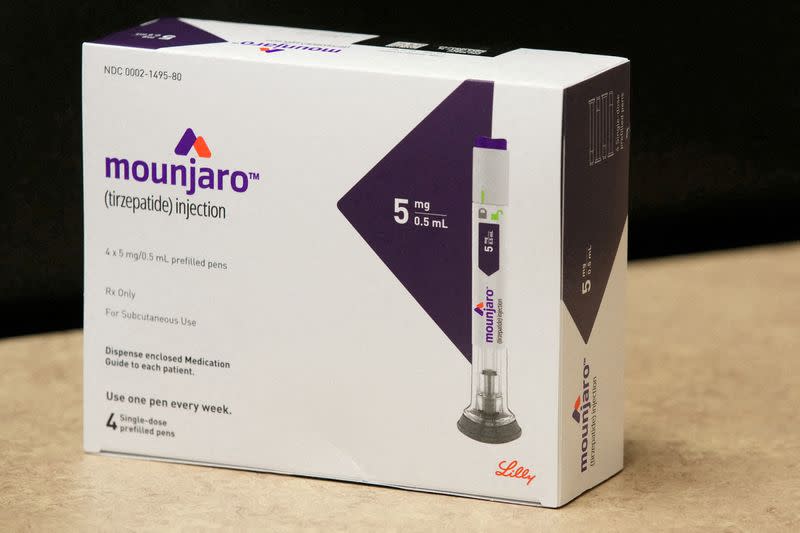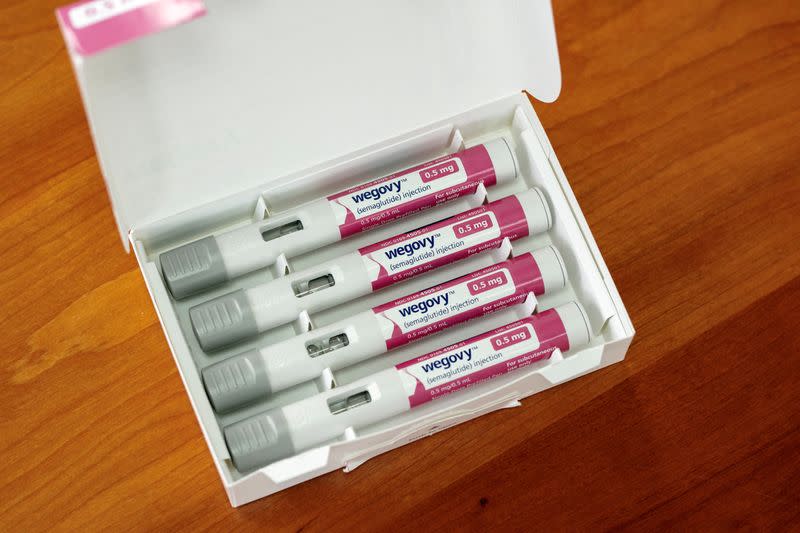Novo Nordisk shares down after analysis finds Lilly drug leads to better weight loss
LONDON (Reuters) - Shares in Novo Nordisk, maker of the wildly popular obesity drug Wegovy, were down 1.9% on Tuesday after the publication of a data analysis showing rival Eli Lilly's own treatment Mounjaro leads to faster and greater weight loss.
The analysis was published on Monday in JAMA Internal Medicine, a medical journal. It examined health records and other data to assess the pace and percentage of weight loss for overweight and obese people taking tirzepatide - the active ingredient in Lilly's Mounjaro and Zepbound - and semaglutide - the main ingredient in Wegovy and Ozempic.
In the absence of head-to-head randomised controlled trials comparing the two drugs, researchers used the health records and pharmacy dispensing data to analyse weight loss trajectories in 9,193 patients receiving Mounjaro and the same number of closely matched patients receiving Ozempic. The average participant weighed 242 pounds (110 kg), and about half had type 2 diabetes.
After accounting for individual risk factors, patients taking Mounjaro were 76% more likely to lose at least 5% of their body weight, more than twice as likely to lose at least 10%, and more than three times as likely to lose at least 15%, compared to patients taking Ozempic, the report found.
Novo Nordisk in an emailed statement said: "This analysis compared the weight loss outcomes of semaglutide (Ozempic) and tirzepatide (Mounjaro) and did not include Wegovy even though weight loss was the main objective assessed." It said that the best way to compare the two weight-loss drugs is through a head-to head clinical trial, and noted that no such trial has yet been completed.
A Lilly spokesperson declined to comment, saying that the company was not involved with the study. The spokesperson said that the company is currently studying tirzepatide and semaglutide in patients with obesity in a late-stage trial that is expected to finish later this year.
The two drugmakers, the world's biggest producers of insulin, are the first-to-market with highly effective weight-loss drugs, a booming market that could be worth $150 billion in annual sales by the early 2030s, according to some analysts. Both are racing to increase production of their drugs, which are delivered in a once-weekly self-injection pen.
The researchers noted that Ozempic and Mounjaro are both intended for use by people with type 2 diabetes, but half of the study participants were using the drugs for weight loss only, which may have impacted the results.
The results of this analysis were initially published in November on the website medRxiv in advance of peer review.
Shares in Novo and Lilly are at record highs on profits from the weight-loss drugs. Although Novo's Wegovy has been on the market in the United States since 2021, Lilly's version, sold as Zepbound in the U.S., only launched there late last year.
(Reporting by Greta Rosen Fondahn in Gdansk and Maggie Fick in London, Editing by Louise Heavens and David Evans)

 Yahoo Finance
Yahoo Finance 

